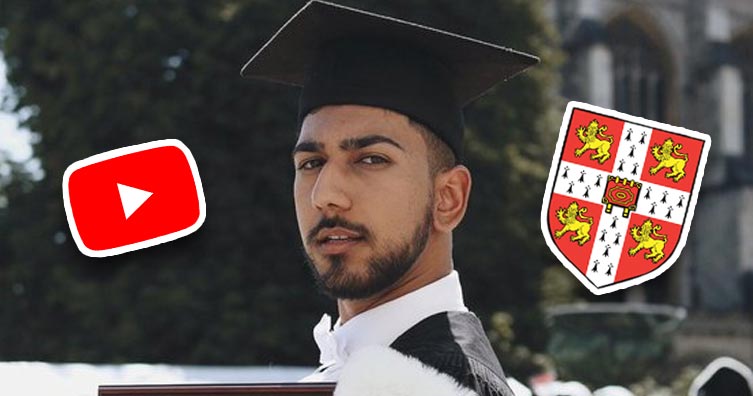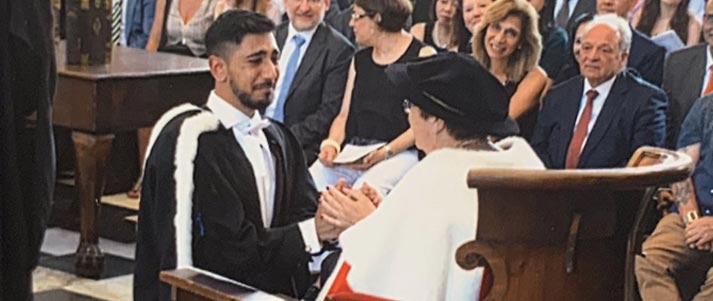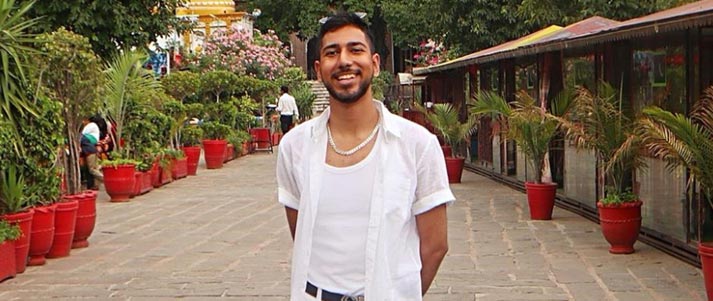Ibz Mo: Interview with the leading studytuber
If you've ever felt like a top university isn't for you, one YouTuber could make you think again. Ibz Mo is the grad inspiring a generation to push past disadvantages and reach their potential.

Credit: Ibz Mo (main image) – Twitter
As a state-school educated, BAME, first-generation graduate from the University of Cambridge, Ibrahim Mohammed (a.k.a. Ibz Mo) is a studytuber who is encouraging students to defy statistics and aim for the top.
Unfamiliar with studytube? It refers to a community of students on YouTube who share content about school and uni life. They cover revision techniques, day-in-the-life vlogs and general advice for other young people.
Ibz Mo's YouTube channel is filled with videos that are smart, funny and often painfully relatable. It's no wonder he's racked up 100,000+ subscribers on YouTube, and tens of thousands of followers on Instagram and Twitter.
We caught up with him to chat about everything from getting into Cambridge to his plans for life after university (spoiler: exciting things are ahead).
Ibz Mo on becoming financially independent at 18
After getting two Bs, three Cs and two Ds at GCSE due to difficulties at home and school, Ibrahim decided to support himself financially and live independently while doing his A Levels.
It was no easy feat. He worked long hours to balance his studies with jobs at Primark and a call centre, but the hard work paid off – in a very big way.
Achieving A*A*A in his A Levels, he got a place to study Human, Social and Political Science at one of the top universities in the world.
How did he do it? He told us:
I was in the call centre, I think it was 24 hours a week, and then I worked in Primark eight hours a week, so it was a lot more than I should have been doing. But I just did it, you know?
My routine was: I’d go to college at 9am, I’d finish at 4pm and then I would work in a call centre from 5–9pm. Then I would come back home and I would study from 10pm–2am.
With the money he made from work, Ibrahim was able to buy important study equipment –something which meant a lot to him.
It was little things like buying a desk for myself, buying an office chair for myself, buying pens for myself.
The biggest investment I made is when I bought my [MacBook], the Mac that I still have now.
It was the first time I’d had a laptop – even in GCSEs, I didn’t have a laptop. So, having a laptop, I think, was massive.
And, what advice would he give to other young people who are financially independent?
You need to work out ways where you hardly spend any money to do well in school, and that basically means you stick with the basics.
You don’t have to buy the most expensive stuff; you don’t have to buy all these brands. You just need to buy the basics – what you need […] your stationery and a desk that you can buy for £30 off Argos.
And just basically spending the least money you can, and really investing in your education.
Although he achieved the grades he needed for Cambridge, Ibrahim described his A Level routine as “very unhealthy“.
After the intensity of his work and studies, he decided to take a gap year, working as a volunteer at his sixth form to teach other students revision tips and techniques.
Applying to the University of Cambridge as a disadvantaged student
From first-hand experience, Ibrahim knows the barriers a lot of students have to go through to get into top universities. This includes financial struggles and unsupportive teachers.
Does he consider state-school education to impact students’ self-belief?
Oh 100%, yeah. Just coming from a state-school background alone, we’re already told ‘Oxbridge isn’t really for you’.
But, as he’s proven, the top universities are for him and others from similar backgrounds.
When he started his YouTube channel at university to document his educational journey and share advice, his subscriber count started growing rapidly, as many people could relate to him and his experiences.
I think, me getting into Cambridge really was like a big thing for my community of students who not only are first-generation, who are BAME, but also who are poor.
For Ibrahim, one defining factor that led him to apply to the University of Cambridge was the support of a brilliant teacher at sixth form.
When I was 18 – when I was told ‘you can get into Cambridge’ by my teacher – it was the first time someone had ever said that to me in my life.
And in fact, when I was 17 […] she said something like, ‘we’re going to make a sociologist out of you’, and for me, that was the first time that someone ever even believed in me in terms of – I could have a career.
My family never really did that, nor did my past teachers, so it had a massive impact on me, someone just believing in me.
Even if it was just one person, it had a massive impact because then I […] finally had someone who gave me the confidence, and I kind of wanted to live up to that and really do them proud.
Support for disadvantaged students at universities
We asked Ibrahim if he thought universities are currently doing enough to support students from disadvantaged backgrounds. He told us:
I can relate it to getting into Oxbridge.
So, does Oxbridge do enough to support disadvantaged backgrounds? It depends, because even within that you have to look at the different variations of disadvantage, and the different variations of Oxbridge.
When explaining this, Ibrahim focused on the collegiate systems within Oxford and Cambridge – before you apply to either uni, it’s really important to research each college to find the one that best suits you.
For example, Wolfson College, where he went, could have a very different approach to diversity and accessibility, compared to other colleges within the uni.
In Cambridge, there are 31 colleges, but one college’s strategies are very different to another college.
You basically then have to get rid of the whole Cambridge thing, and so [there’s] Trinity College which are doing a lot to help their students, Fitzwilliam College which do a lot to help their students, compared to maybe St John’s which isn’t doing really a lot.
Referring to the Stormzy Scholarship as an example, Ibrahim recognises that the University of Cambridge as a whole is working hard to improve its accessibility and diversity. However, there’s still more it can do.
I know that university-wide, they are trying their best and this has basically been through speaking to academics who are experienced, speaking to students who have gone through the system like myself, and other students who have graduated, and really learning about what they can do to improve.
But, in a realm of access into university, there’s always going to be more that you can do.
It’s never going to be enough, you know? There’s always going to be a statistic that can be 1% higher over a single year […] but is it good? Is it sustainable?
I think that Cambridge is on the right path.
How Ibz Mo faced discrimination as a university student
Like too many students from BAME and disadvantaged backgrounds, Ibrahim has faced unfair discrimination while at university. His experiences have included hearing offensive terms and sentiments about Pakistani people and Muslims.
Potentially reflecting a worrying prejudice of some staff at Cambridge, he also suggested:
The amount of times that a BME student gets asked for ID compared to a white student is very different.
But, he has some good advice for other students with similar experiences:
I would say that you have to be yourself and remember institutions like Oxbridge were not made for us, they’re not even ready for us to an extent.
You really need to make your own space and take up that space as well. If that means challenging the current system in a way that’s not harmful to anyone, then do that.
Whenever we have all of our balls […] I always will wear South Asian traditional Pakistani clothing. I will never wear a suit and tie, and it’s not to harm anyone – it’s just so you know a bit of my culture.
Ultimately, he told us it’s important to stay true to yourself and “be as authentic as you can be“.
Ibz Mo on graduating from the University of Cambridge

Credit: Ibz Mo – Twitter
After working so hard both before and during uni, how did it feel to receive his degree and graduate from the University of Cambridge? Ibz Mo said:
I cried. I cried so much […] I was the only person that cried – I’m so dramatic.
It’s clear how much the moment meant to him. Describing the day, he told us:
I haven’t spoken to every single student in my college, but I recognised everyone’s faces […] and I remember seeing everyone from the past three years, and all of us walking there and then we were at [Senate House].
When we were at the ceremony and all of our names got called individually, it was so emotional.
And, along with the historic traditions of the graduation ceremony, Ibrahim also found it moving to know his family were there to share the day with him.
I think just seeing my family in the audience as well – my family have never come to Cambridge before, they’re not familiar with it and were sometimes quite unsupportive, but I think it just made me realise that I’ve really come a long way to be here.
So it was a very emotional moment.
What’s next for Ibz Mo?

Credit: IbzMo – Instagram
When we spoke to Ibrahim, there were (unsurprisingly) a lot of exciting things ahead following his graduation – starting with a Graduate Diploma in Law (GDL).
I’m going to be doing a conversion course into law, and I’m going to be working for a law firm in Pakistan simultaneously.
I’m basically planning to build a school in Pakistan in my mum’s village, so I need to learn the law of the land and learn about real estate law […] it’s a ten-year project that we’ve started.
And as if that wasn’t enough…
On top of that, I have a charity called BTYS Ltd. that was kind of inspired by all of the YouTube work I’ve done.
With BTYS Ltd., he’ll be going to a number of disadvantaged schools to give presentations.
The reason being is because, even to want to go on YouTube and to search ‘How to apply to Cambridge’ […] you have to have a certain viewpoint, which is that you know that you can maybe apply to Cambridge.
There are students that don’t even know it […] so our plan now is to basically tackle these schools and really push for that, and be like, ‘you can apply here‘.
Thinking about uni but unsure how to choose the right uni and degree? Check out our guide for some top tips.








